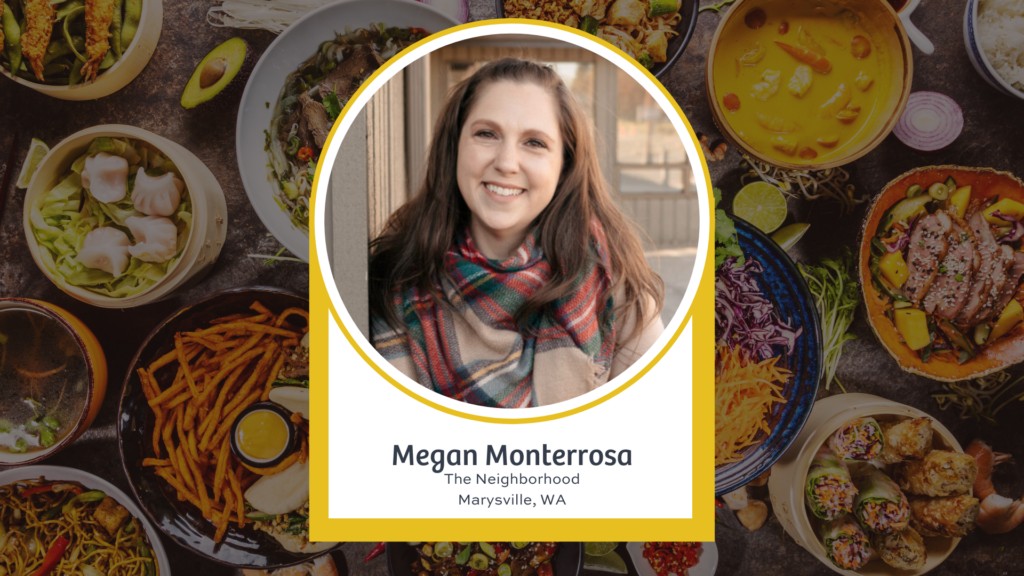Three Ways to Learn
Listen
Watch
Show Notes
When Megan Monterrosa hosted her first Dinner Church gathering, only four visitors showed up. In this episode, you’ll hear about why Megan persevered and how they rapidly grew to two flourishing congregations.
Megan Monterrosa is on staff at the Grove Church in Marysville, Washington where she leads a Dinner Church called The Neighborhood, and is an executive assistant to the lead pastor. She is passionate to reach the lost, see Jesus move in the lives of individuals and help them discover their God-given purpose in missional living. She is pursuing a Master of Divinity degree from Kairos University and is in the process of becoming a licensed minister with the Assemblies of God.
Help us spread the word about the Dinner Church podcast by subscribing and leaving us reviews on Apple Podcasts, Spotify, YouTube or wherever you enjoy your podcasts.

Related Resources:
Email us: podcasts@freshexpressions.com
Interview Summary
You know, no matter what happens, you’re going to do the best you can. And then. And it’s up to God.” — Megan Monterrosa
Exploring the transformative journey of Dinner Churches, this blog post delves into the innovative approach to ministry as host Verlon Fosner is joined by Megan Monterrosa on the latest episode of the Dinner Church podcast. Megan, a pivotal figure in the Seattle religious community, shares profound insights into the inception, development, and spiritual essence of Dinner Churches.
Megan Monterrosa’s leadership in developing Dinner Churches in the Seattle area highlights her commitment to creating meaningful community connections through shared meals and spiritual fellowship. Her initiatives focus not just on gathering but on fostering a familial atmosphere where community and spirituality intertwine.
The Genesis of an Idea
The concept of the Dinner Church began as a response to a felt need for more community-oriented spiritual experiences. Megan describes the initial steps taken to realize this vision:
“So I was on staff at the Grove Church in Marysville, Washington… We started talking about possibly doing a dinner church… We went to one of the Dinner Church Encounters, which is where you can learn a lot about the church in a short timeframe.” — Megan Monterrosa
This initiative was birthed from a combination of divine inspiration and community feedback, emphasizing the church’s proactive approach to meet the needs of its congregants and surrounding community.
Rapid Growth and Community Impact
The Dinner Church model quickly proved to be effective, necessitating the launch of additional services to accommodate growing interest. Megan highlights the organic growth and the community’s enthusiastic response:
“It did start to grow rapidly, so within six months we had to open a second one because we couldn’t contain it, in the space.” — Megan Monterrosa
This expansion underscores the Dinner Church’s appeal and effectiveness in fostering community ties and engaging members in a more intimate and meaningful manner.
Spiritual and Operational Insights
Megan shares insights on managing the spiritual and operational aspects of running Dinner Churches. She stresses the importance of spiritual guidance in her leadership and operational decisions:
“I felt that pull from the Lord. But, you know, it was incredible… It augmented the journey. That’s what it did. And you just find the time, you know, it is never easy, but it is definitely worth it.” — Megan Monterrosa
Her narrative reinforces the need for a balance between spiritual intuition and practical management, ensuring that the church’s activities are both spiritually driven and operationally viable.
Megan Monterrosa’s experiences illuminate the Dinner Church model as a beacon of innovation in ministry, emphasizing community, spirituality, and growth. Her insights provide valuable lessons for others interested in exploring similar community-centric approaches to ministry.
Reflection Questions
- How can the principles discussed by Megan enhance your current ministry practices?
- What might be the challenges and benefits of implementing a Dinner Church in your area?
- How can you ensure that your ministry activities align with both spiritual guidance and operational needs?
- In what ways can you foster a deeper sense of community in your existing church activities?
- What are the key components of a successful community outreach program, based on Megan’s experience?

